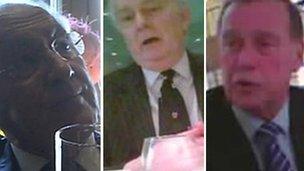No 10 plans statutory register of lobbyists bill by July
- Published
- comments

Legislation to introduce a statutory register of lobbyists will be published in the next couple of months, Downing Street has said.
No 10 said it would also include proposed reforms to party funding and changes to trade union rules.
The BBC's Norman Smith said this would be politically contentious and could make it harder to get agreement.
It comes after three peers and an MP were accused of agreeing to do parliamentary work for payment.
Lord Cunningham, Lord Mackenzie of Framwellgate and Lord Laird, and MP Patrick Mercer all deny wrong-doing and their cases are being investigated by standards watchdogs.
The coalition pledged to introduce a statutory register of lobbyists when it came to power in 2010 but critics have accused the government of inaction over the issue.
'Shabby'
Following the latest revelations, No 10 said it would bring forward a bill before the end of July.
As well as plans for a statutory register, Downing Street said it would include measures to end self-certification of trade union membership and reform third-party funding of election campaigns.
These are likely to be controversial as the unions are large financial backers of Labour.
Secret filming shows Patrick Mercer signing a contract with the fake lobbying company set up by BBC Panorama
The end of self-certification for trade unions means they will be required to carry out an annual audit of their membership and demonstrate that the figures they produce are accurate.
A certification officer will be given the power to conduct investigations into the numbers produced, which are vital when ballots on strike action are conducted.
The reform of the third-party funding of election campaigns would attempt to close a loophole in rules governing the cap on spending by political parties during an election period.
Currently, for instance, if a political party was to ask a trade union to print leaflets on its behalf, the only cost to that political party would be the cost of the printing itself.
The bill would seek to ensure a party was liable for the full expense of related overheads - such as staffing and rent for premises - where that organisation is affiliated to the party or gives it more than £100,000 a year.
'Greater transparency'
A Labour source said including the union measures in the lobbying bill was "shabby... cheap politics".
"The best way to proceed if you want to take big money out of politics and clean up the lobbying scandal is to act on a cross-party basis," they added.
"This seems to be a shabby and panicked response by David Cameron to divert attention from a set of damaging headlines hitting the Conservative Party."
TUC general secretary Frances O'Grady said: "The government is cynically trying to exploit a political sleaze scandal to crack down on unions, which are democratic and accountable organisations."
Karen Jennings, assistant general secretary of Unison, a union representing public sector workers, said: "We are not lobbyists, so we have no place in a bill about lobbyists."
Earlier on Monday, Deputy Prime Minister Nick Clegg said the latest "unsettling but not surprising" allegations were symptomatic of a political system "long crying out for head-to-toe reform".
He said: "We need to be realistic: there is no single, magical protection against an individual politician determined to behave unethically or inappropriately."
The debate follows the release by the Sunday Times of secretly-filmed footage that shows Lord Laird, Lord Mackenzie of Framwellgate and Lord Cunningham appearing to offer to help a fake solar energy company.
The House of Lords code of conduct says peers cannot engage in "paid advocacy" - using their access to Parliament to make a profit.
On Saturday, the BBC's Panorama programme released footage - again secretly filmed - of Mr Mercer appearing to offer a Commons security pass to a fake Fijian firm that paid him £4,000 to ask parliamentary questions
All four have denied breaking parliamentary rules but have referred themselves to the standards watchdog.
Panorama will be shown on BBC One at 21:00 BST on Thursday.
- Published3 June 2013
- Published2 June 2013
- Published1 June 2013
- Published3 June 2013
- Published2 June 2013